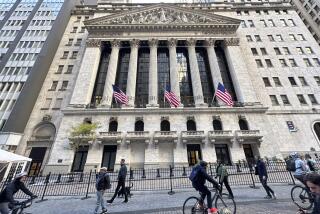Short, Mild Downturn Now Expected
- Share via
WASHINGTON — Unexpected glimmers of strength in the U.S. economy are causing some analysts and policymakers to conclude that the current downturn, though no doubt a recession, will be shorter and milder than previously feared.
A string of upbeat developments, from military advances in Afghanistan to rising confidence at home, are causing economy-watchers and policymakers to recalibrate previous assumptions about the length and depth of the downturn.
“The numbers are looking much better. The economy is still contracting, but the rate of decline is moderating,” said Mark Zandi, chief economist at Economy.com, a Pennsylvania-based forecasting firm. “It’s made everyone a little more comfortable that this will be a mild recession, and a short-lived one.”
No one is claiming the economy has turned the corner just yet. There will be dark days ahead as job losses mount and businesses struggle to stay afloat. Economists are warning that about 1.5 million Americans will lose their jobs, while others will see their hours cut back or bonus pay reduced.
Nonetheless, the outlook has changed and that is complicating prospects for congressional action on economic stimulus legislation. The sense of urgency to pass something immediately has moderated, although the door has possibly opened to a wider range of options.
“For those of us who were looking for a real stimulus in December, our enthusiasm is starting to wane a little bit,” said Bill Hoagland, the chief of the Senate Budget Committee’s Republican staff. “We’ve missed our opportunity to have a major impact.”
Economists cite several reasons for the revised assessments. The U.S.-led military campaign against Afghanistan’s Taliban regime is advancing rapidly, reducing anxiety about the potential for more terrorist attacks on U.S. soil. Oil prices have declined substantially in recent weeks, providing Americans with the equivalent of a massive tax cut. Stock prices began rallying several weeks ago as investors began focusing on a future recovery.
Recent statistical surprises have contributed to the improving psychology. Retail sales surged in October, mainly in response to 0% financing for auto purchases. A widely watched index of forward-looking economic indicators rose unexpectedly.
There was more good news Wednesday. The Labor Department reported that the number of U.S. workers filing new claims for jobless benefits fell for the fourth week in a row, a sign that the pace of layoffs is moderating. Also, the University of Michigan’s consumer confidence index rose for a second consecutive month, suggesting that the wave of anxiety created by the Sept. 11 attacks has subsided somewhat.
Some economists say they are revising upward their predictions of the economy’s performance in the near term. For example, Macroeconomic Advisers, a St. Louis forecasting shop, says it now expects the economy to shrink at an annual rate of 2.3% in the fourth quarter, instead of the 3% contraction it previously predicted. It expects the economy to rebound in early 2002, with growth accelerating to 2.3% in the first quarter and 3.2% for the entire year.
At Goldman, Sachs & Co. in New York, senior economist Ed McKelvey said a similar fourth-quarter revision was a possibility, although the firm remains more bearish than many of its peers. “I don’t think I’d read any sea change into the numbers just yet,” he said.
Neal Soss, chief economist at Credit Suisse First Boston, expressed similar caution. “I think this is confirmation that the recession is going to be a relatively mild one,” he said of the latest statistics. “But that’s not to say we should declare the patient is healthy, and therefore no further medication is required. The recession is not over yet.”
In fact, several analysts warned that for most Americans, the worst is yet to come.
U.S. employers already have shed more than 900,000 jobs since the downturn began last year, and the unemployment rate has risen from 3.9% to 5.4%. But Zandi, the Economy.com analyst, said he expects job losses to continue mounting for months before reaching about 1.5 million, and many economists expect the unemployment rate to hit 6% sometime next year.
“People are still going to experience job losses, lost hours, cuts in pay, poor bonuses if any bonuses at all. We’re going to see bankruptcies surge early next year, both personal and business. A lot of retailers aren’t going to make it after Christmas. So there’s a lot of pain and suffering to come,” Zandi said.
Even so, the current slump looks increasingly like a lightweight, at least by historical standards. Instead of lasting almost a year, like a typical recession, this downturn probably will end after six months or so, economists say. Instead of chopping 1.5% from gross domestic product, the broadest measure of U.S. economic activity, the damage is likely to be limited to about half that.
On Capitol Hill, the prospect that the downturn could be shallower and end sooner than previously expected may change the political calculations underlying the debate over economic stimulus legislation.
After the terrorist attacks, Congress and the White House pledged to put partisanship aside and quickly pass a package of tax cuts and spending increases designed to keep the economy from collapsing. But the spirit of bipartisanship soon dissipated. The GOP-led House passed a stimulus package featuring business tax breaks long favored by Republicans. Senate Democrats crafted a competing plan tilted toward aid to unemployed workers and other spending programs.
The two sides have remained deadlocked.
More to Read
Inside the business of entertainment
The Wide Shot brings you news, analysis and insights on everything from streaming wars to production — and what it all means for the future.
You may occasionally receive promotional content from the Los Angeles Times.










